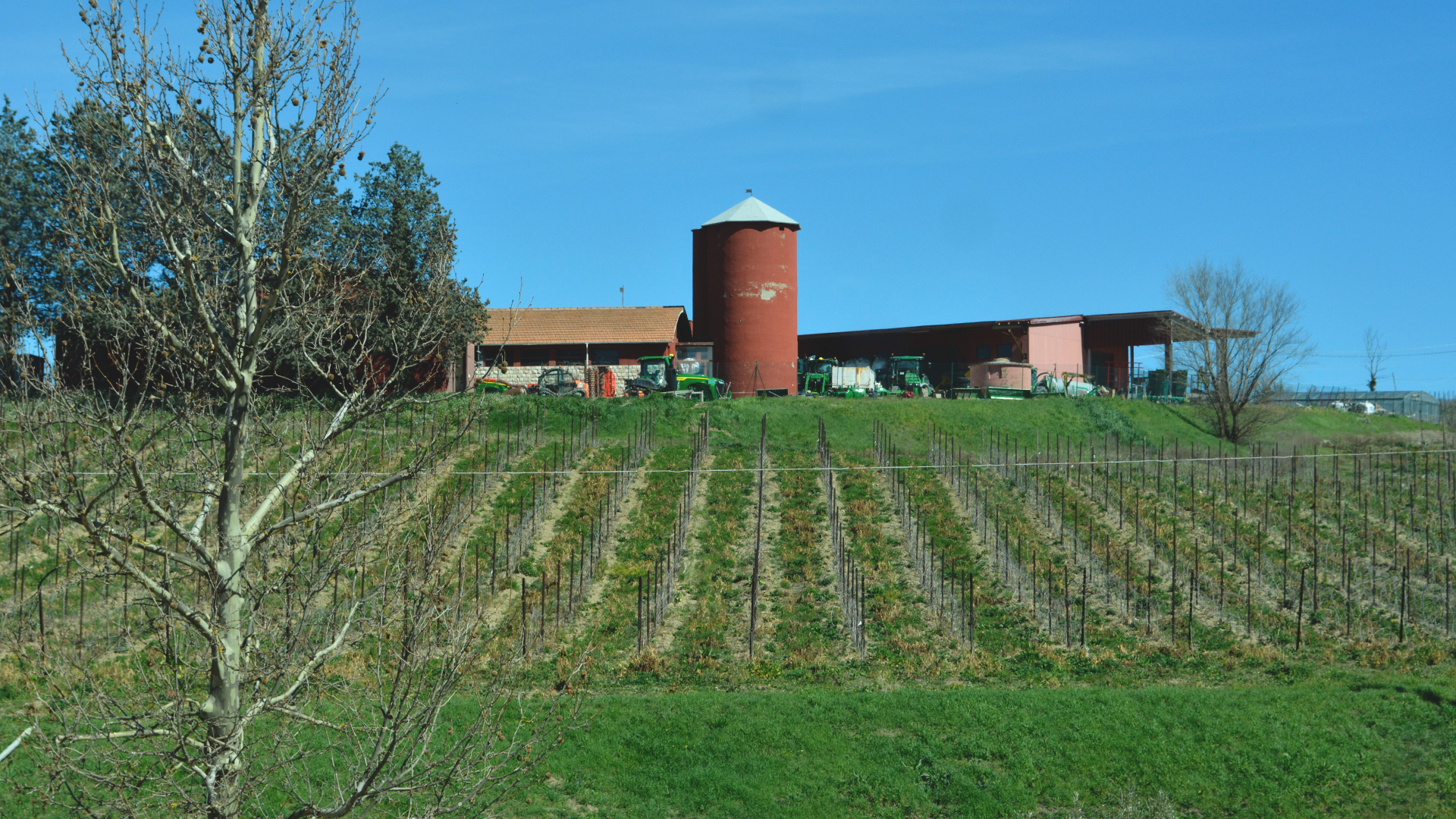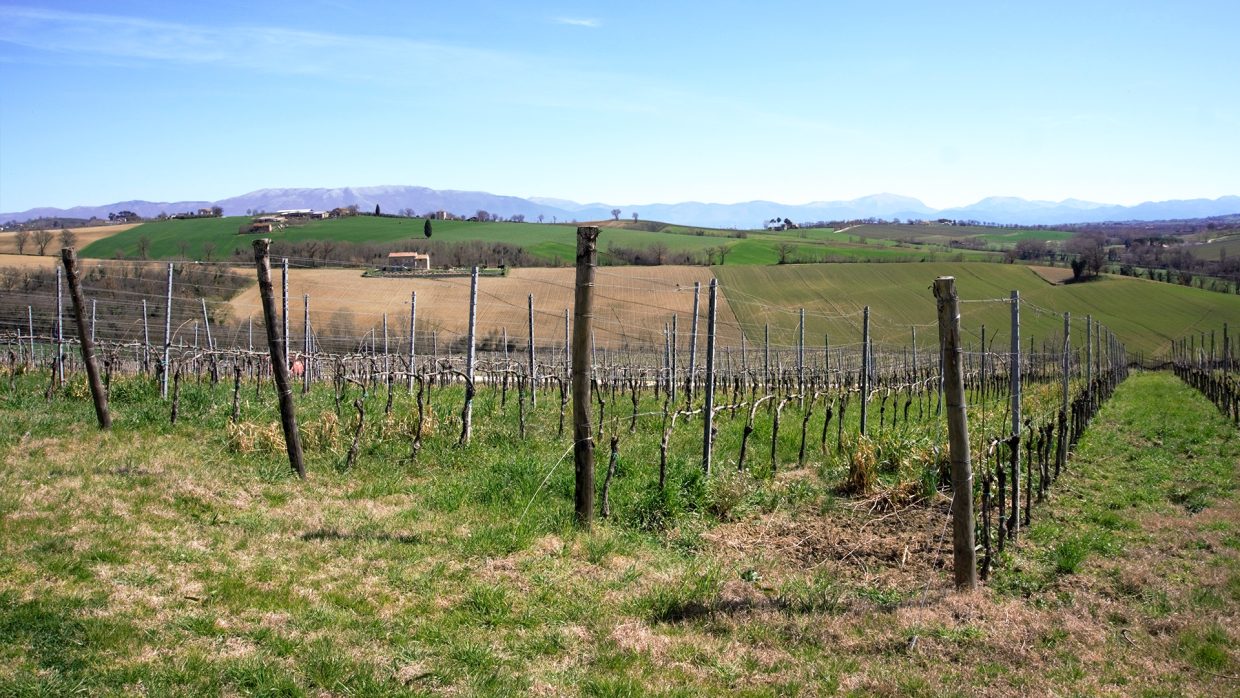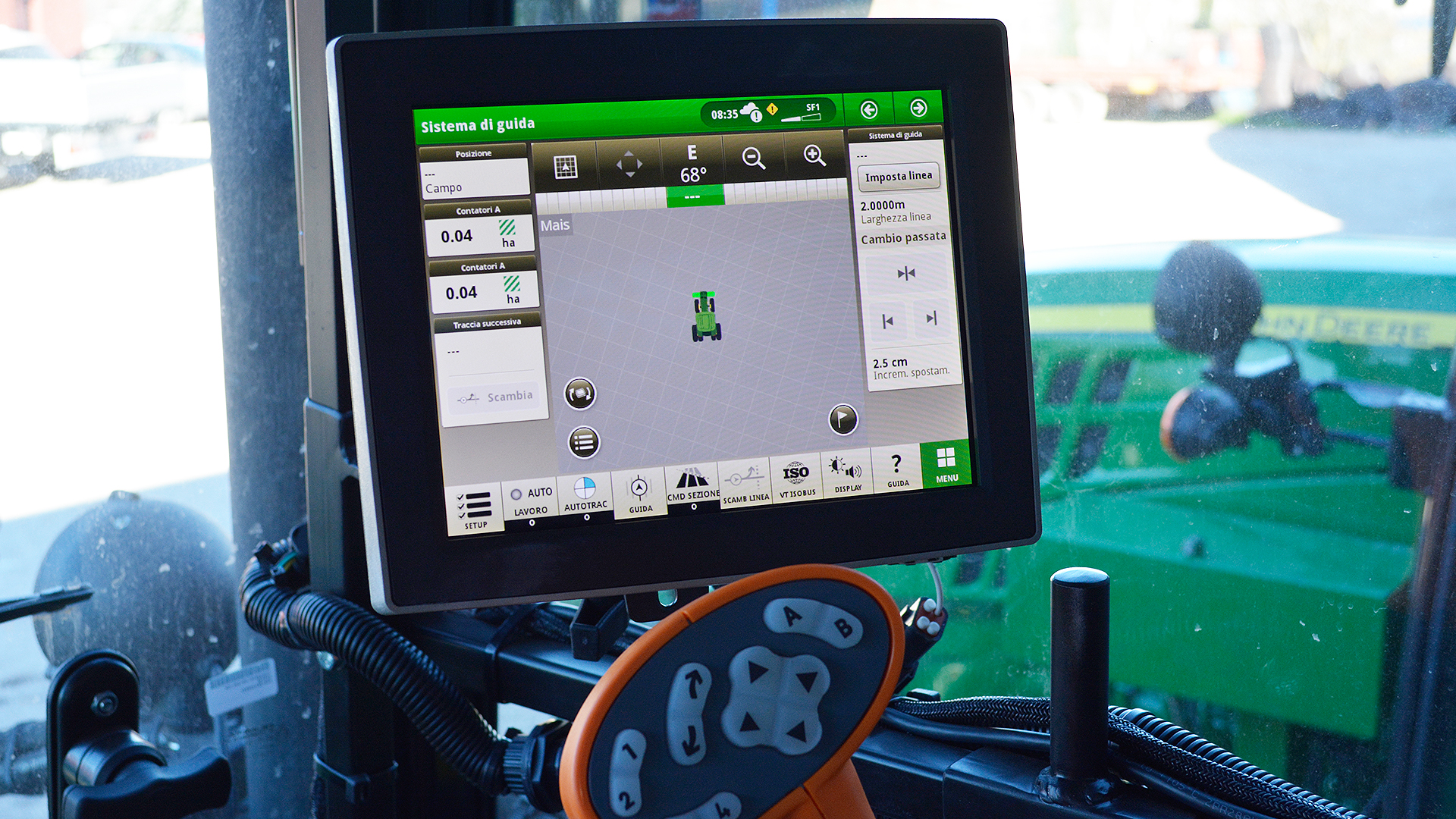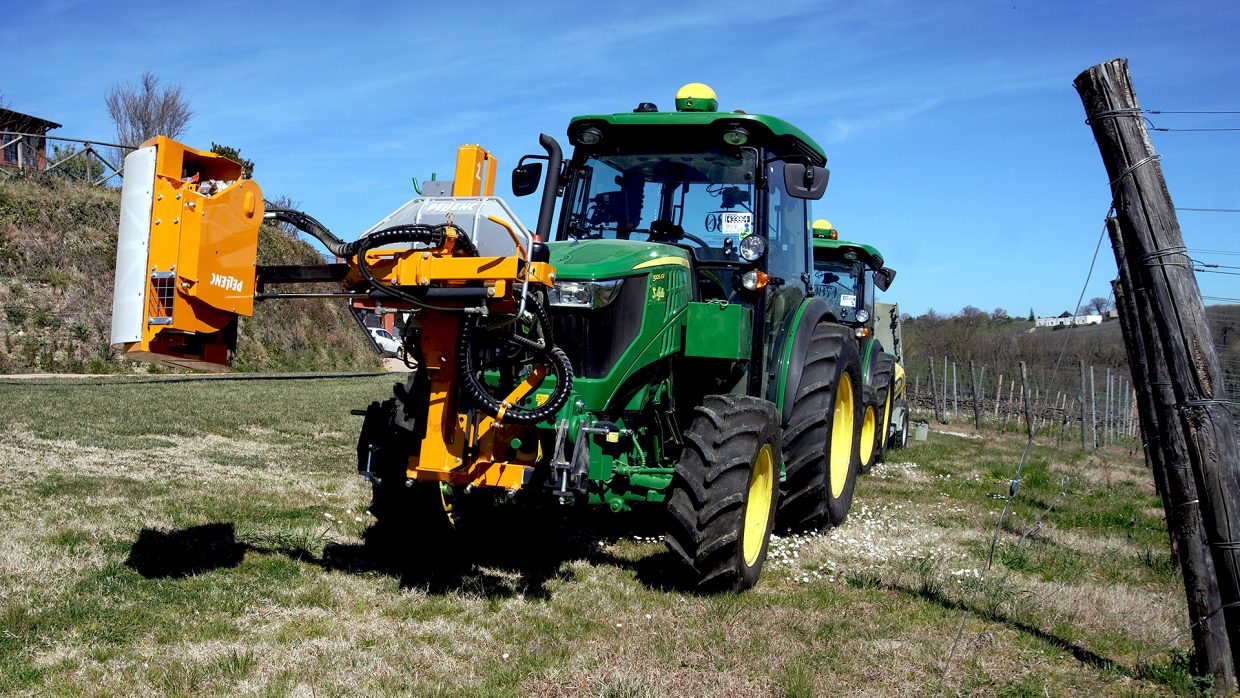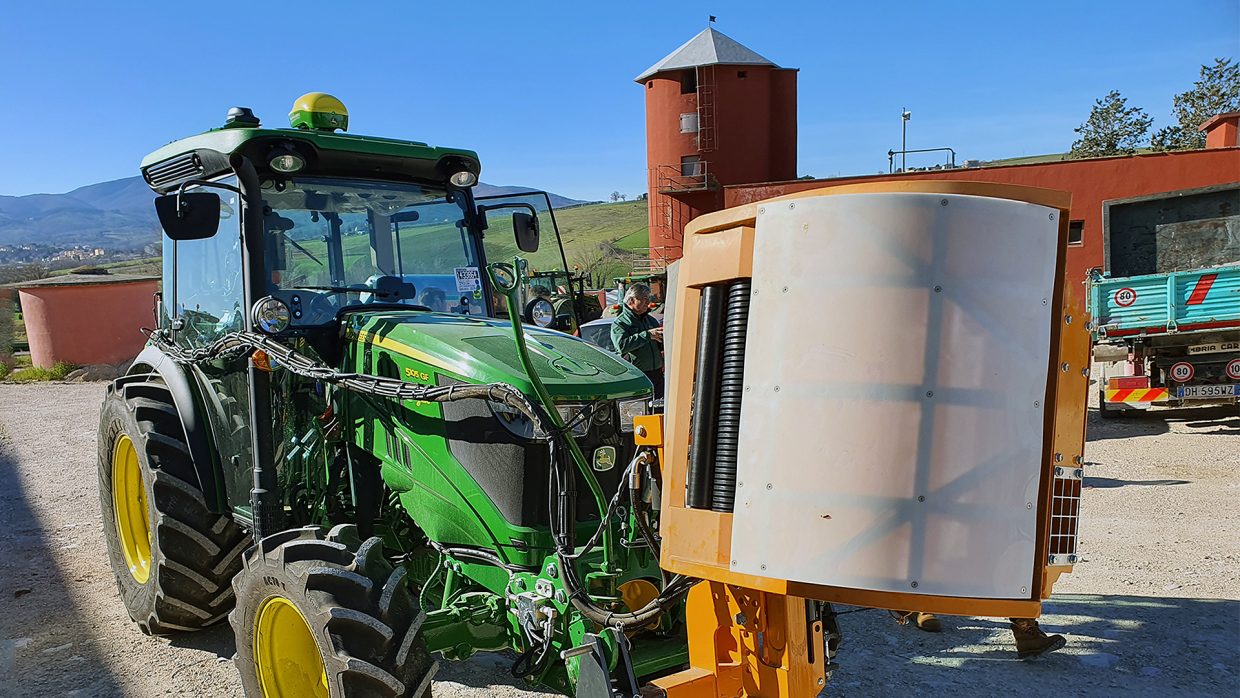Making one’s way along the roads that meander through the hills of Umbria in central Italy, in addition to lush forests, small villages, and medieval cities, it is not uncommon to encounter cereal fields, vineyards and stretches of olives trees.
The Farchioni Group, which, inspired by Luigi Farchioni, began producing oil and flour using a small stone mill and water in the municipality of Spoleto in 1780 developed from availability of these crops. The production of wine and beer would follow later, after the construction of an advanced olive oil mill and an electrical rolling mill in the 1950s. Those mills were later replaced by the grain mill still in operation today.
In 1998 the Cantina Terre de la Custodia winery in the Montefalco area was founded to publicise excellent local wines such as Sagrantino and Grechetto. Diversification of the company’s products continued in 2010 with the creation of the Mastri Birrai Umbri brewery. This involves growing several hundred hectares of grain, such as barley and wheat, and other brewing ingredients, such as chickpeas, lentils, and aromatic hops.
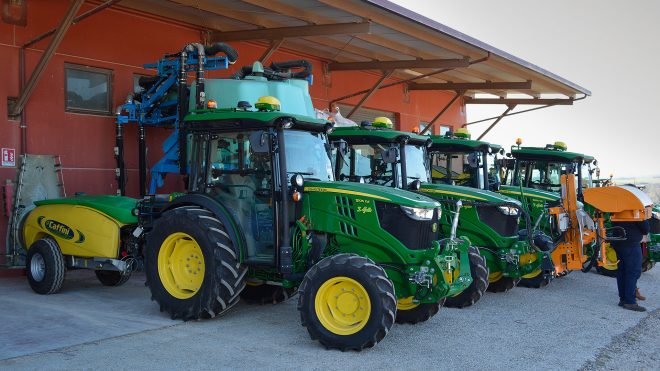
Agricultural investment and innovation
Starting in 2014, the Group increased its agricultural investments, adding to the areas under cultivation and the fleet of farming vehicles and equipment. Today, the company, still under the firm direction of the Farchioni family, and with its headquarters in Gualdo Cattaneo, in the Perugia province, has reached revenues of approximately €140 million. It has a total of 4,500ha of forest and agricultural farmland, agro-industry and services in several regions in Italy. Four thousand hectares are dedicated to cultivation of grains, olives, vines, legumes, vegetables and hazelnuts.
Farchioni controls the production processes from the field to the finished product and tries to influence other parts of the process through communication campaigns and careful development of products right from the design phase. The goal is to support consumers in using and recycling packaging materials.
Sustainability is one of the key principles of the Group, which has been publishing its own sustainability report, covering all its agricultural products and related production processes, since 2020. The report is certified and edited in accordance with the international standards of the United Nations‘ 2030 Agenda.
We acquired the first tractors with satellite receivers in 2014.
Stefano Bartolucci
When it comes to managing different crops, ranging from extensive to intensive, high-yielding crops, the Group looks to simplify field working processes. From this perspective, Farchioni is an exemplary case: a model of a company that has been able to evolve while considering and making the most of the opportunities offered by Industry 4.0 within agriculture. Over the past two or three years the Group, mainly driven by the Umbria division, has taken advantage of government grants and financing provided by the plan. It has modernised most of its equipment in close collaboration with a developer of agricultural automation controls and systems according to the high technical standard of QS Control (in Narni, Terni).
“Our company is large, with fragmented fields and properties separated from one another by hundreds of kilometres. That’s why moving in the direction of connected machines, documentation of field work and precision farming were necessary and, in some ways, an almost inevitable transition,” says Stefano Bartolucci, Farchioni’s head of agricultural activities. “We acquired the first tractors with satellite receivers in 2014. I remember wondering at the time whether and how they would prove useful.”
Making better use of skilled workers with JDLink
“In the 2019-2020 period, we started working with JDLink, the John Deere remote control system that allows us to consult and compare company machine-performance within our own fleet, but also across different organisations through the John Deere Operations Center. When, three years ago, we decided to buy some new equipment, we were already convinced and had the new machines equipped with a full package of precision agriculture and connectivity solutions.”
Currently, there are more than 40 machines, 30 of which are John Deere, seven track tractors, and two harvesters for olive groves and vineyards. All are controlled by the JDLink system.
The improvements that Bartolucci and his team implemented are all intended to simplify the use of technologically advanced farm equipment, making it almost intuitive to operate, to help tackle a labour shortage. “More than 60 employees work on our farms,” says Bartolucci. “But only about half are able to operate tractors and, of those, only 10 are able to handle the equipment well and deal with any problems that might arise.”
The procedures have been standardised, the controls are more intuitive to operate, and therefore easier to use, for both the experienced and less experienced workers.
Stefano Bartolucci
“With the technology now implemented on our machines and thanks to QS Control, we can plan and manage everyone’s work remotely from the offices at Gualdo Cattaneo without having to go on site. The procedures have been standardised, the controls are more intuitive to operate, and therefore easier to use, for both the experienced and less experienced workers.”
Today, when an operator gets into a machine to work at a specific location, whether in Umbria, Lazio or Tuscany, they get an information package. It comprises detailed boundary lines of the field as well as the pre-planned work and agronomic parameters that need to be followed. It’s all visualised through the Operations Center on the display monitor in the cab.
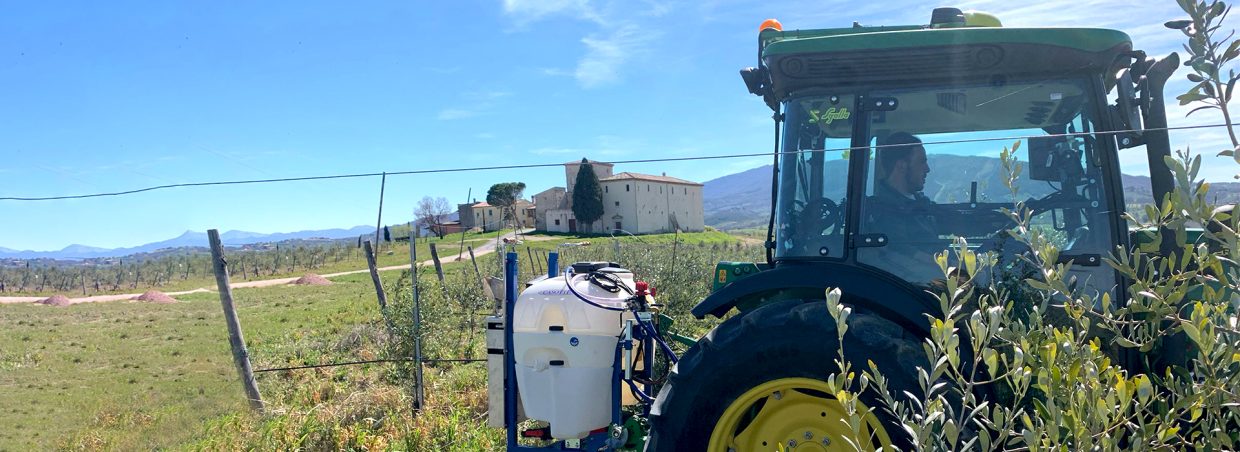
The operator accepts the work order and starts working in the field, carrying out a task according to defined standards, without having to worry about making mistakes due, for example, to the variety, or crop position. Once a task is finished, the management office receives a notification and archives all the agronomic data related to the job, such as work depth, seeding and fertilisation rate, or crop yields.
This is done for all crops, including grain, legumes, vegetables, olives, and wine. The team at Farchioni developed a couple of special control systems, for example for the defoliation in vineyards. The system ensures operation only on the side of the row which is exposed to the sun. One machine is dedicated to precise and punctual inter-row weeding in olive or hazelnut groves and vineyards. There is also a special Isobus sprayer used for the organic treatment for olive fly, which, by multiple sensors and a compass, can deliver the product either only to the south or to the west of the plot and only around each plant. These are just a few examples of the innovative technologies incorporated into Farchioni’s range of agricultural equipment.
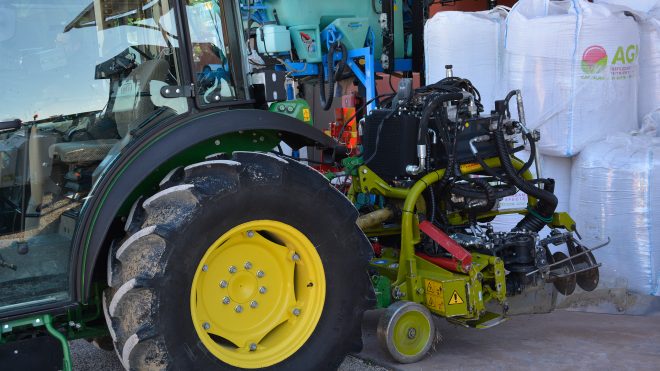
“We are still studying and testing this new equipment, which has already brought us notable improvements in the standard of operations and more accurate management,” say Matteo Casciola, Giacomo Italiani, Michele Mangoni and Stefano Annibali (managers of vineyards, olive groves, arable land and of the Group’s management platforms, respectively). “Monitoring the equipment is easier than it used to be, just as changing programs and operational settings is faster if something unexpected occurs or with sudden bad weather, without the need to call anyone or wait for feedback from the field.” This results in higher efficiency, optimised and shortened work times, as well as optimised and reduced use of crop-protection chemicals and expenses related to labour and fuel.
Above all, however, the greatest advantage, according to Bartolucci, is the creation of real “evidence”; something that used to be done by hand with manual data collection is today a precise, digitised process, which is also useful in terms of traceability controls within the supply chain or for the recording of data related to company certifications. “The agronomic data is an inexhaustible source of analysis: a true and proper support for the decision-making process,” Bartolucci says. “This makes it possible to recalibrate and rework our decisions with great efficiency. We started to use this technology to meticulously trace every operation and variable in the field and now we can apply it to the total farm area. We are continuing to study and to experiment with new applications to even further improve performance and our profitability.”
Farchioni Group
For many years, Italian conglomerate Farchioni has been producing oil, flour, wine, and beer and exporting it internationally. This has encompassed traceability and a controlled supply chain, environmental and social sustainability and innovation, as well as a focus on its agricultural machinery.
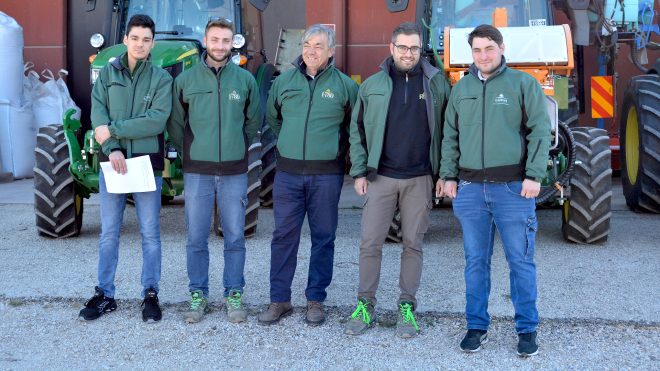
Left to right: Stefano Annibali, control platforms manager, Matteo Casciola, manager, vineyards, Stefano Bartolucci, manager, agricultural activities, Giacomo Italiani, manager, olive grove operations, Michele Mangoni, manager, arable land for the Farchioni Group.

